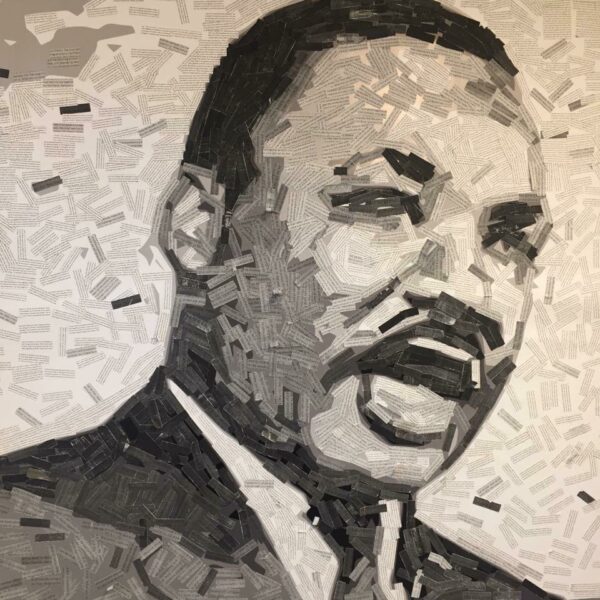Instead of posting a tidy quote this Martin Luther King, Jr. Day and then re-posting it sometime during Black History Month, I’m asking fellow white folks to join me in taking the time to listen, learn, watch, and read what his words were all about–even if it makes us uncomfortable, especially if it makes us uncomfortable–then use that information to be the kind of ally who takes action to break down the systemic racism that is in place.
(This isn’t a complete or perfect list, but I’m trying. If we don’t at least start somewhere, the change that is needed cannot happen.)
Start with How to Be a Better White Person in 2020 by Michael Harriot.
(Everything that follows pretty much addresses one of those points. And any of it can be broken down into age-appropriate language/examples for our kids. That, in itself, might be some of the most important action we take.)
Better grasp what “systemic racism” is and how it’s real.
Read Dr. King’s book WHY WE CAN’T WAIT. Watch the movie “Selma.” Visit The King Center website to better understand his work, rather than listen to interpretations of it by people who tend to water it down for their own purposes.
Remember that Black history, voices, people should be celebrated all year long, not just during the 28 days of February.
Read books that detail a more thorough US history through lenses that are different than ours (and the biased history books we learned from in school).
Get the ME AND WHITE SUPREMACY WORKBOOK by Layla F. Saad to really dive in.
Learn Why White School Districts Have So Much More Money by Clare Lombardo.
Then take a closer look at 13 Ways White Male Privilege Shows Up As Early As Elementary School.
And see what deliberate action looks like by reading Educators and Race: A Conversation with Author Ijeoma Oluo on Tackling Systemic Racism in U.S. Education by Kara Yorio. Then talk to our school districts to get the ball rolling. (An email to principals and school librarians only takes a minute.)
Read the essay “When They See Us” Is Triggering. That’s Why You Should Watch It by Zenobia Jeffries Warfield. Then get on Netflix (they have a free trial) to watch it. Then watch one of the interviews of the men, like Oprah’s.
Refresh our memory–or gain some perspective–by watching The Atlantic Slave Trade in Two Minutes, keeping in mind that each dot is a ship filled with human beings.
Pick up some of these 10 Books About Race To Read Instead Of Asking A Person Of Color To Explain Things To You. Many are available at physical and online libraries, so are accessible for free.
When you read, hear, or learn of something race-related that makes you feel anywhere from a bit uncomfortable to genuinely horrified, go learn more. Turn that moment into an opportunity to understand the new information better, and be a part of preventing it from happening again.
If a people get loud and insist they are being victimized, don’t argue with them. Listen until your eyes and ears are more fully opened, because if they already had been you would have heard those people before they needed to shout to get attention.
If the buffer of fiction (realistic or historical) is something that makes more of an impact for our kids/teens because they can better imagine stepping into someone else’s shoes, then try these books by Black authors. Follow Cicely Lewis’ work on her Read Woke initiative via the #readwoke hashtag on Instagram for more book ideas.
Listen to Black voices like Tarana Burke and Andre Henry and Ijeoma Oluo and Ally Henny and Bryan Stevenson (as interviewed by James McWilliams) and Rachel Cargle and Ibram X. Kendi and Laverne Cox and Clint Smith and so many others of all genders and identities and experiences. REALLY REALLY LISTEN.
Really look at whether our feminism is helping or hurting by reading How White Feminists Oppress Black Women: When Feminism Functions as White Supremacy, then make any necessary corrections to our approach.
Regularly listen to BIPOC voices through physical or audiobooks.
Learn what to say when people around us say racist things, whether at home, work, school, with family, etc., then speak up. Every time.
Make sure we are registered to vote. Help others get registered to vote and learn how to vote. Do some research on the candidates from small local elections to the big ones, and only vote for those who seek to end systemic racism. Help the campaigns of those people, too: our voice, time, money, spotlight.
Make sure to use the power of our voices and our dollars. Use them both to give power to those who want to fix this and take it away from those who don’t. That includes:
- people we nominate for volunteer PTA positions at our kids’ schools
- people to recommend for promotions at our jobs; people we decide to interact with socially
- people whose businesses (big or small) we use/shop at
- the art, movies, music, clothing, books, etc. we pay for
- the voices/presence we amplify with posts and shares and Likes and Comments on social media
- the advocacy groups we support with our monetary or time donations
Every time we either say something or not, spend something or not, is a choice. It is a decision as to who we are giving more power to.
We must make those decisions more wisely if we want change.
So let’s go make some change.

Kim Bongiorno is an author, full time freelance writer, and the blogger behind Let Me Start By Saying. Learn more by connecting with her: Facebook · Twitter · Instagram · Goodreads · BookBub · Newsletter
Leave a Reply